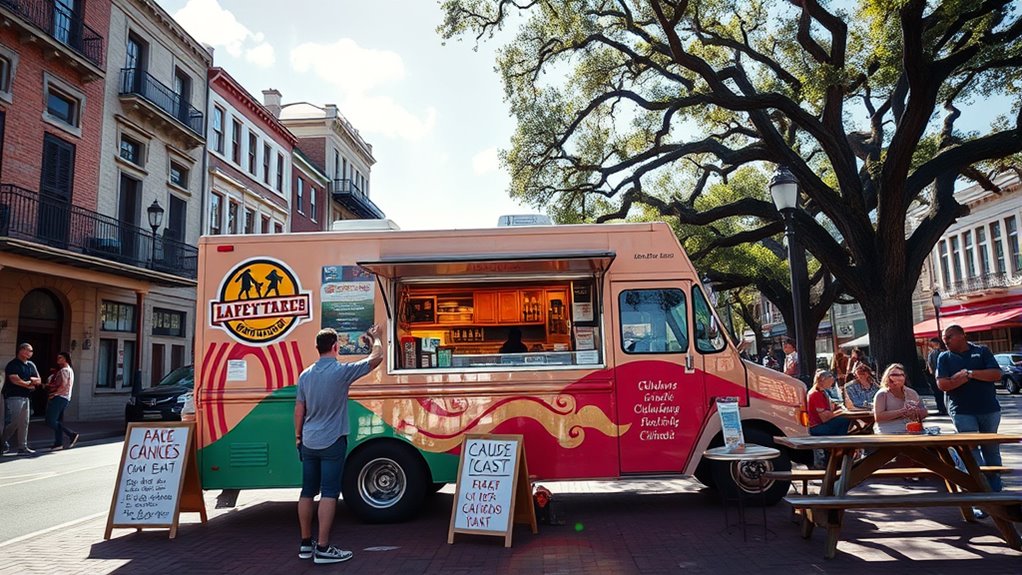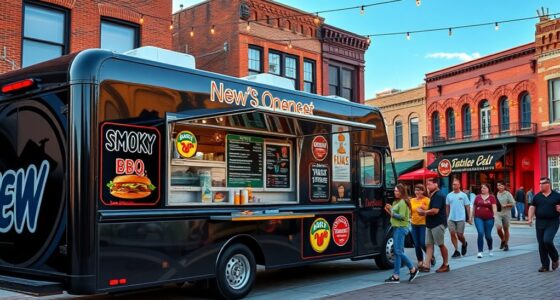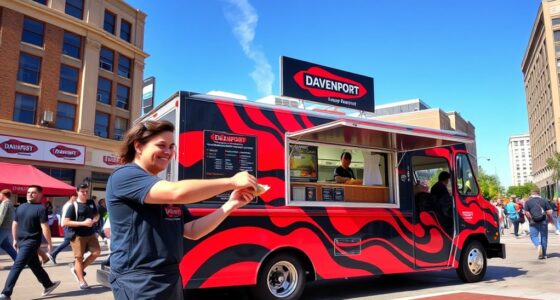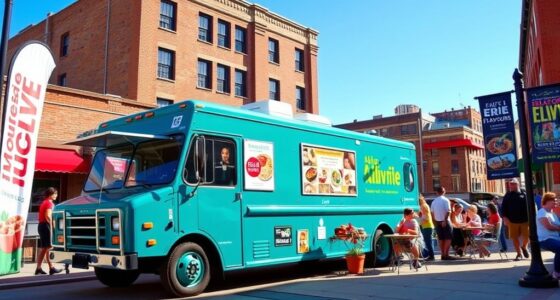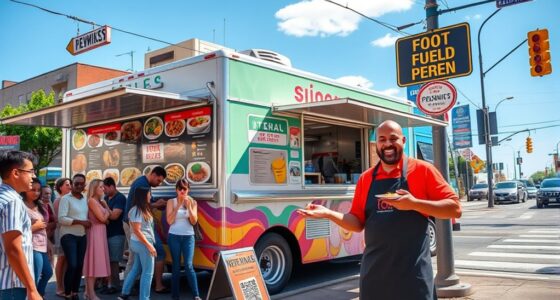To start a food truck in Lafayette, you’ll need permits like the Mobile Food Establishment Permit (~$50), Peddler’s Permit, and liability insurance (at least $500,000 coverage). Find high-visibility locations such as Lafayette Jockey Lot or local festivals, ensuring you meet zoning and parking rules. Develop a Louisiana-inspired, simple menu that complies with health standards. Use social media and local events to boost your presence—more tips are ahead to help you succeed.
Key Takeaways
- Obtain necessary permits including Mobile Food Establishment, Peddler’s, and Occupational Licenses from Lafayette city and Louisiana health authorities.
- Budget approximately $50 for permits, $150 annually for health inspections, and $500,000 liability insurance for compliance.
- Choose high-visibility locations like Lafayette Jockey Lot, Moncus Park, or participate in festivals and farmers markets.
- Develop a simple, Louisiana-inspired menu that meets health standards and appeals to diverse customers.
- Use digital platforms, participate in local events, and highlight unique offerings to effectively market and grow your food truck business.
Navigating Permit Requirements and Costs in Lafayette
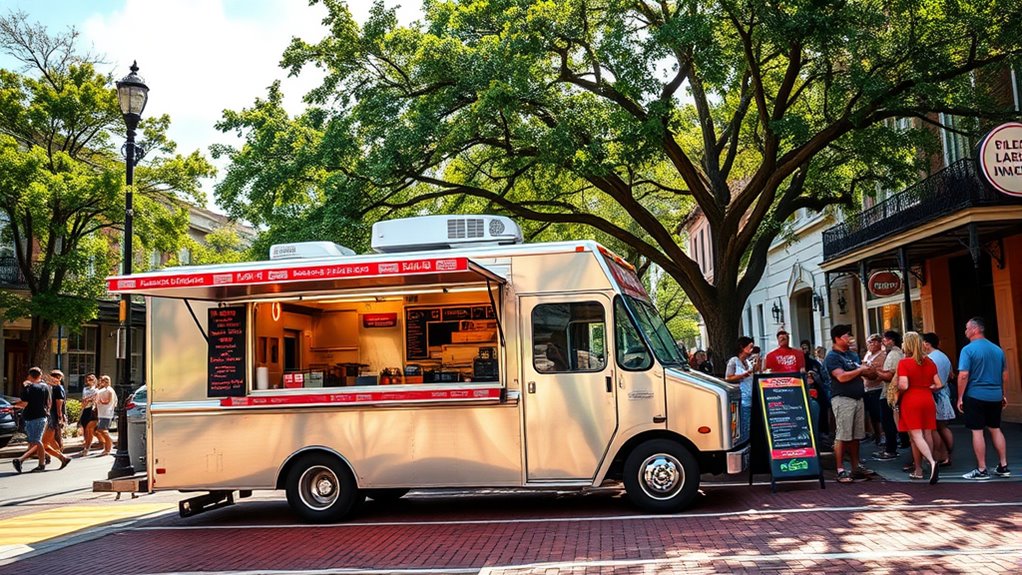
Understanding permit requirements and costs in Lafayette is essential for legally operating your food truck. You’ll need a Mobile Food Establishment Permit from Lafayette City-Parish, along with a Peddler’s Permit specific for food trucks. An Occupational License is also required for conducting business locally. Depending on your setup, you might need a Certificate of Occupancy. All applications should be submitted at Lafayette’s permit office at 220 West Willow Street. Budget around $50 for the application and approximately $400 for the permit itself. You’ll also pay about $150 annually for the health permit, which includes passing inspections and complying with Louisiana Department of Health standards. Vehicle registration, current Louisiana driver’s licenses, and insurance coverage with at least $500,000 are mandatory. Renewals and ongoing compliance are crucial to avoid fines or shutdowns. Additionally, City-specific health and safety inspections are required to ensure your food truck meets all local standards before operation. Regular updates and adherence to local regulation changes can prevent unexpected compliance issues.
Securing the Perfect Food Truck Location in Lafayette
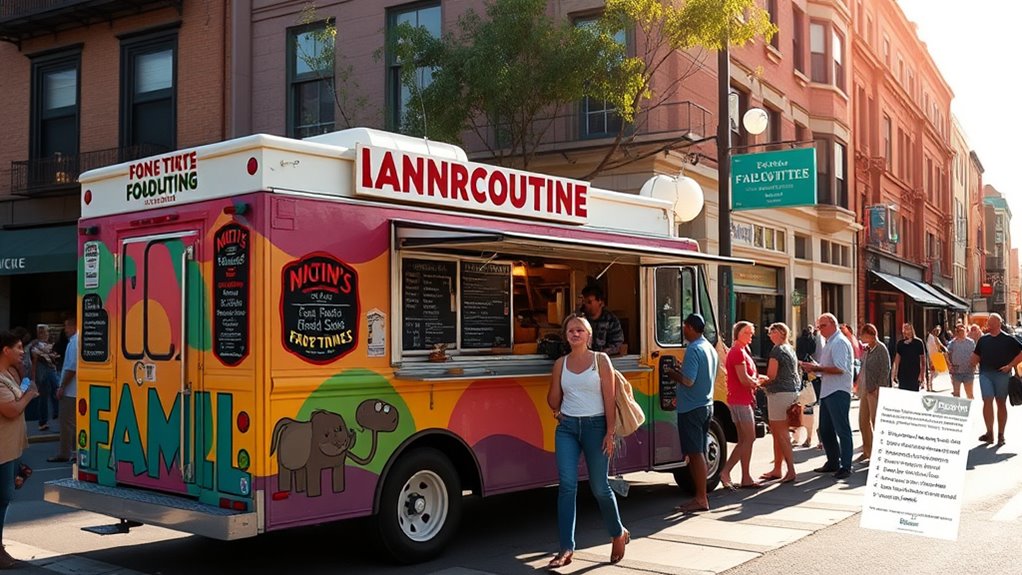
To secure the best spot for your food truck, you need to consider designated vending areas and understand local parking and zoning rules. These factors can impact your permit process and daily operations. Exploring event and lot opportunities nearby can also boost visibility and customer traffic for your business. Additionally, assessing the local zoning regulations helps ensure your chosen location complies with community standards and restrictions.
Designated Vending Areas
Securing the perfect food truck location in Lafayette requires maneuvering designated vending areas that balance visibility, accessibility, and compliance. The Lafayette Jockey Lot offers weekly rental spaces with fees based on a flat rate or sales, featuring permanent stands and trailer spaces. The Lafayette Farmers & Artisans Market at Moncus Park operates Saturdays, with strict vendor and product guidelines. The city designates “blue areas” for mobile trucks, enforcing rules on operation times, parking, and cleanliness. Additionally, LDH permits regulate food safety and mobile unit standards, requiring a commissary within 50 miles. Be aware that certain event zones restrict vending during large gatherings, and outdoor placement must follow safety and signage rules. Use the table below to navigate these key vending zones.
Proper understanding of health benefits of fruit juice varieties can help you promote healthier menu options to your customers.
Parking and Zoning Rules
Proper parking and zoning adherence can make or break your success in Lafayette’s food truck scene. Ensuring you park legally and within zoning limits helps avoid fines and operational disruptions. You must meet parking space requirements, such as one space per 250 sq ft, and ensure trucks are at least 100 feet from restaurants or outdoor dining areas. Parking areas must be located on or contiguous to the principal use’s lot, with specific distance criteria. Your parking must not interfere with pedestrian, bicycle, or other transportation modes, and loading zones should follow safety standards. Additionally, zoning rules differ across city and parish limits, with downtown rules possibly overriding general requirements. Be aware of vehicle weight limits and size restrictions to prevent illegal parking. Compliance guarantees smooth operation and neighborhood harmony. It’s also important to stay updated on local regulations that may change periodically to ensure ongoing compliance.
Event and Lot Opportunities
Looking for the best spots to showcase your food truck in Lafayette? Consider participating in Food Truck Friday Acadiana at the CAJUNDOME parking lot, held weekly from 11 AM to 1:30 PM. This event draws crowds with rotating local vendors, offering high foot traffic and excellent exposure. Keep in mind, you must register early, pay a fee, and meet vendor requirements like self-sufficiency and face coverings. Additionally, Lafayette’s first official food truck park at Parc De Oaks on Moss Street provides a steady spot with amenities like seating and shaded areas, attracting regular customers. Food trucks actively participate in Lafayette’s thriving mobile food culture, and you can also join festivals, farmers markets, or rent private lots near offices or recreation centers for targeted lunchtime or weekend sales, boosting your brand in the community. Establishing a presence in popular food truck locations can significantly increase your customer base and visibility.
Developing a Compliant and Appealing Menu

Creating a menu that is both compliant with local health regulations and appealing to customers requires careful planning and strategic choices. You must guarantee your offerings meet Louisiana Department of Health standards, including food safety, sanitation, and proper handling to prevent cross-contamination. Your menu should reflect Lafayette’s culinary culture, combining traditional Cajun flavors with innovative options, all while being quick to prepare within your truck’s limited space. Keep menu items simple yet distinctive, and consider seasonal ingredients to control costs. Pricing should be fair and transparent, avoiding price gouging while covering operational expenses. Use clear descriptions to communicate your brand’s unique appeal. Regularly review and update your menu with approval from local authorities, maintaining compliance and customer interest. Incorporating diverse genres from popular media can also inspire creative menu themes and presentation styles that resonate with a broad audience.
Effective Marketing Strategies for Lafayette Food Vendors
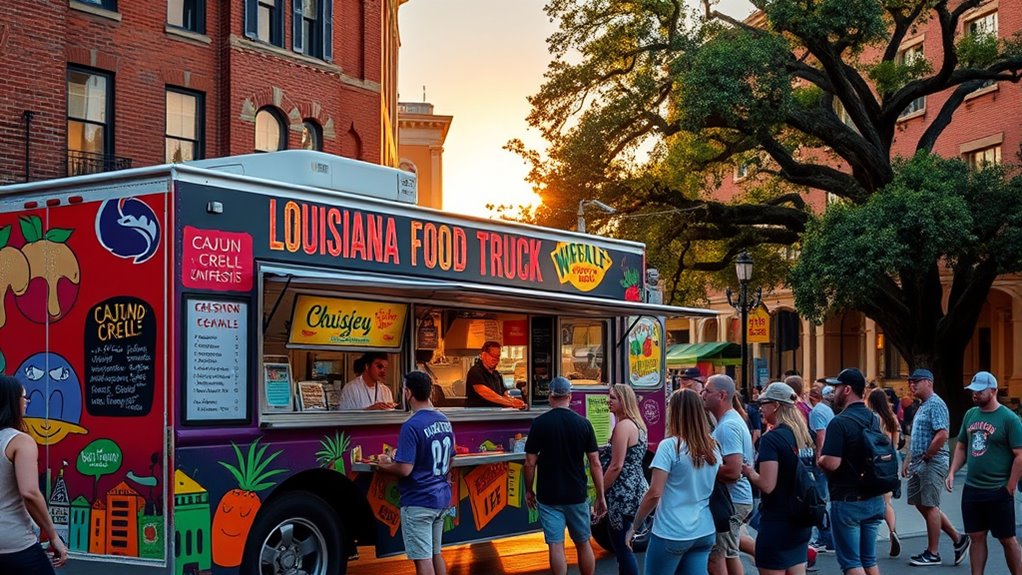
To stand out in Lafayette’s vibrant food scene, leveraging digital platforms and community engagement is essential. List your food truck on apps like Truckster and StreetFoodFinder to reach local and visiting customers actively searching for food options. Keep your location and schedule updated to attract foot traffic consistently. Highlight menu specials and unique offerings within your profiles to entice users. Respond to reviews and messages to build loyalty and gather feedback. Use push notifications to alert followers about events, new locations, or promotions for immediate engagement. Participating in local food truck events, like Food Truck Friday, boosts your visibility and helps you network with other vendors. Developing a strong local brand identity and engaging on social media further amplifies your presence and connects you with Lafayette’s community. Incorporating community engagement strategies can also foster stronger relationships with local residents and increase customer loyalty.
Ensuring Insurance and Operational Compliance
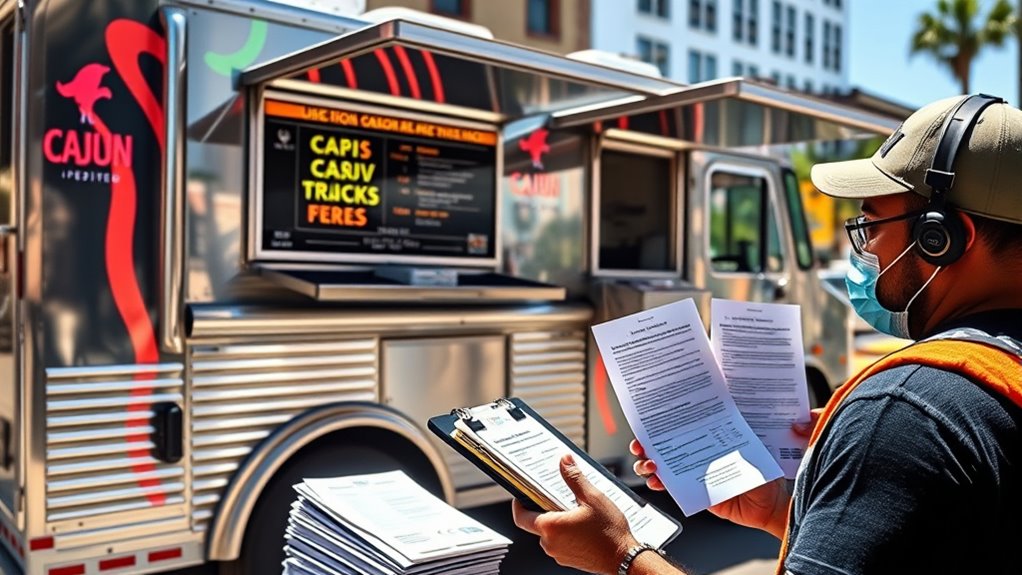
Ensuring insurance and operational compliance is essential for keeping your Lafayette food truck legally protected and running smoothly. You must carry adequate liability insurance, including general liability and a Business Owner’s Policy, covering property damage and interruptions. If you have employees, workers’ compensation is mandatory. Your truck needs valid permits from the Louisiana Department of Health, and your commissary must be within 50 miles of your selling location. Lafayette Jockey Lot requires at least $500,000 liability coverage. Additionally, you should consider specialized insurance like trailer endorsements, professional liability, and cyber coverage. To stay compliant, regularly review your permits, inspection reports, and insurance certificates. Keep detailed records and update your coverage as your operations evolve to avoid fines or legal issues. Understanding the importance of emotional support can also help you manage the stresses associated with starting and running a new business.
Tips for Successful Food Truck Operations in Lafayette
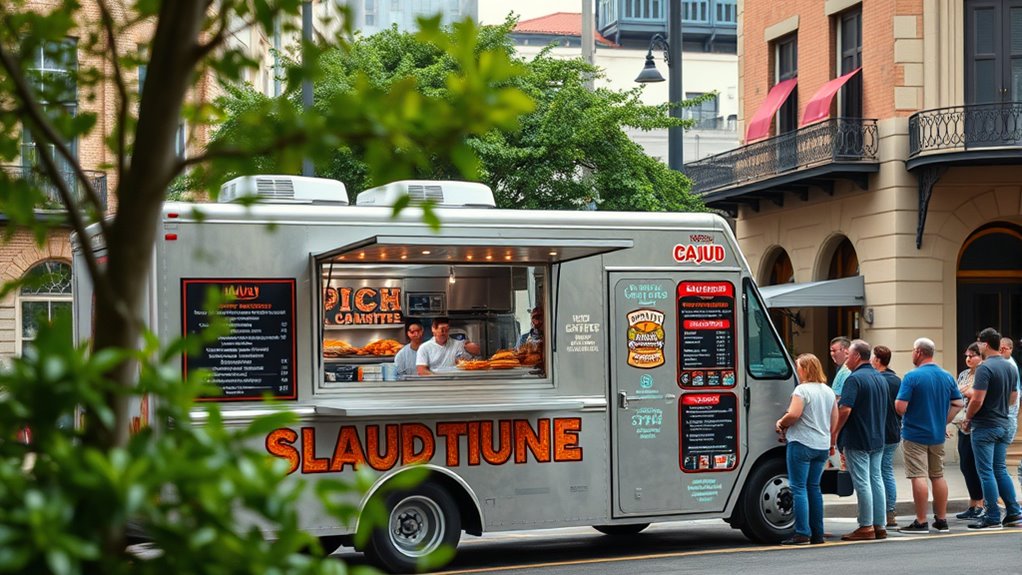
Selecting the right location is essential for a successful food truck operation in Lafayette. Lafayette’s first food truck park, Parc De Oaks, offers a high-visibility spot with shaded grounds, boosting customer comfort and repeat visits. Downtown Lafayette’s Uncle Bob’s Roundup provides covered seating, fans, and restrooms, enhancing the customer experience. Choosing busy event areas or high foot traffic zones increases daily sales, thanks to your truck’s mobility. Participating in local festivals and catering events broadens your reach and revenue streams. Remember to comply with Lafayette zoning laws to avoid fines. Additionally, understanding local permitting requirements ensures smooth operation and helps you avoid potential legal issues.
Frequently Asked Questions
Are There Any Specific Restrictions on Operating Hours for Food Trucks in Lafayette?
You wanna know about operating hours restrictions for food trucks in Lafayette. Currently, there’s no citywide ordinance limiting hours, but venue-specific rules apply—like the Lafayette Jockey Lot requires approved hours, usually daytime, and trucks must be removed nightly. Health and safety rules don’t specify hours but plan for daytime inspections and nightly equipment removal. Always coordinate with venue management to ensure your hours conform and avoid conflicts.
Can I Operate a Food Truck at Events or Festivals Without Additional Permits?
Imagine your food truck as a lively performer on a busy stage; without the right permits, it can’t take the spotlight at festivals. You can’t just roll in and serve without securing an event-specific permit, like a backstage pass. Even if you already have a general license, you need additional permits for each event. Think of it as obtaining a special ticket for each show to ensure you’re allowed to perform.
What Are the Parking Requirements for Food Trucks Outside Designated Zones?
You need to guarantee your food truck meets parking requirements outside designated zones. Park at least 100 feet from entrances to fixed eateries, avoiding blocking pedestrian walkways, bike paths, or traffic flow. You must have proper permits, and parking needs to be accessible from streets or approved access points. Avoid obstructing visibility or safety zones, and adhere to local parking standards, including space size and design, to stay compliant and prevent fines or removal.
How Do I Renew or Transfer My Permits if My Business Changes Location?
When you need to renew or transfer your permits after changing your business location, you must submit an application through the One Stop Licensing portal. Update your business info, including the new address, and provide proof of current food safety certifications and recent inspections. Pay the applicable fees, usually between $50 and $400. Remember, you’ll also need to notify local agencies and possibly undergo new inspections to guarantee compliance.
Are There Any Local Restrictions on Types of Cuisine or Menu Items Allowed?
You won’t find specific local restrictions on cuisine types or menu items in Lafayette. However, all your menu choices must meet Louisiana Department of Health standards for food safety and sanitation. This means you should avoid unpermitted ingredients, and your menu must be prepared with approved equipment and procedures. If you plan to sell alcohol or specialty foods, you’ll need separate permits. Always verify your offerings comply with statewide health regulations.
Conclusion
Starting your food truck journey in Lafayette is like steering through a vibrant festival, filled with flavorful aromas and lively crowds. With the right permits, a prime spot, and a tantalizing menu, you’ll create a mobile culinary experience that draws hungry locals and tourists alike. Keep your insurance tight and your operations smooth, and watch your vibrant food truck become a beloved fixture on Lafayette’s lively streets. Your culinary adventure awaits—grab the wheel and make it unforgettable.
